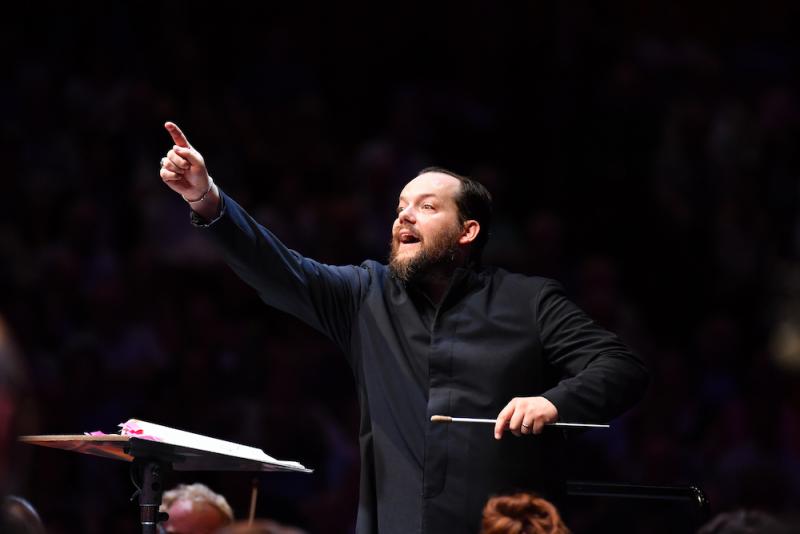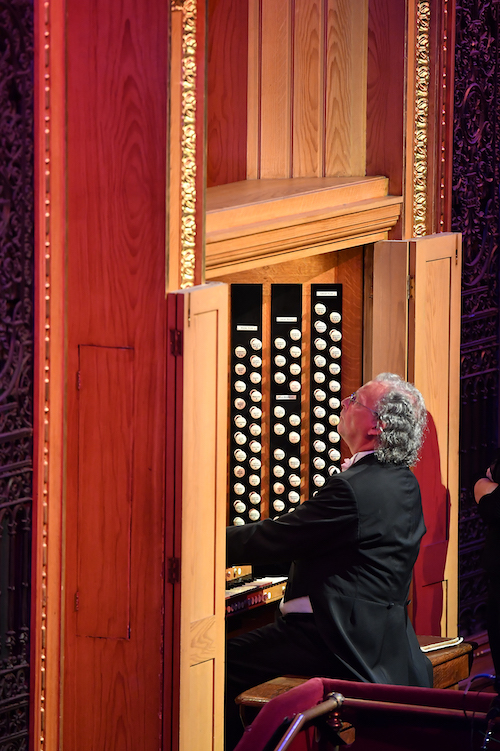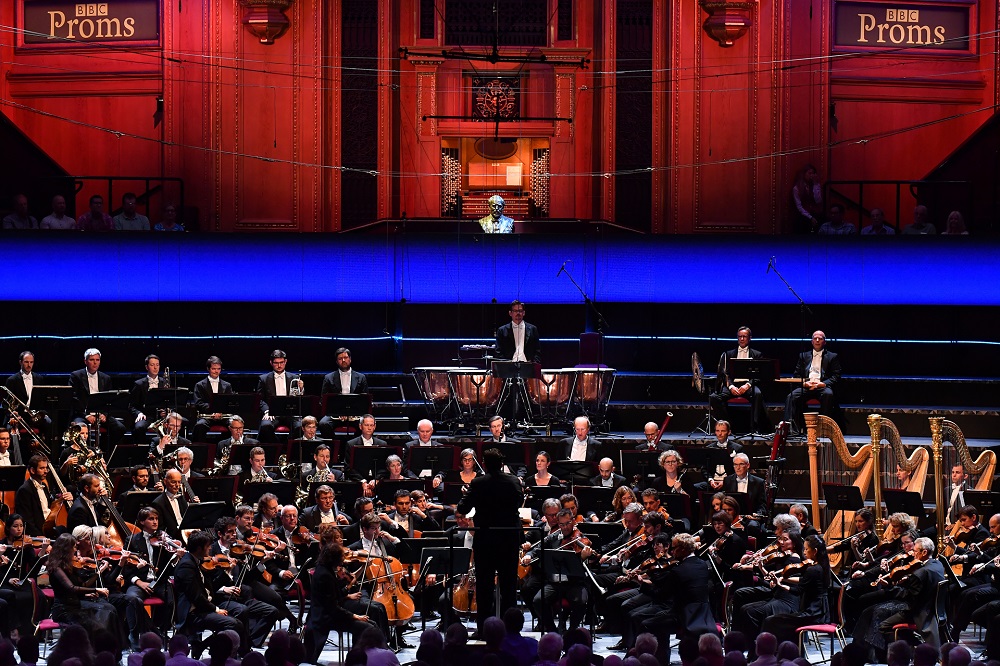Prom 47: Schönheit, Leipzig Gewandhaus, Nelsons review - Bruckner doesn’t quite take flight | reviews, news & interviews
Prom 47: Schönheit, Leipzig Gewandhaus, Nelsons review - Bruckner doesn’t quite take flight
Prom 47: Schönheit, Leipzig Gewandhaus, Nelsons review - Bruckner doesn’t quite take flight
Ravishing sounds from thoroughbred Germans, undermined by sluggish tempos

After Thursday night’s concert I celebrated the Proms’ exploration of unfamiliar repertoire via the CBSO. The following evening saw the festival diving back into mainstream repertoire – as it must also do – conducted by the CBSO’s previous music director.
Before we got to Bruckner we had some Bach organ music, played on the Albert Hall’s mighty instrument by the Leipzig Gewandhaus’s resident organist (since 1984) Michael Schönheit (pictured below). He presented five pieces, making the half-hour first half into a mini-recital. It is somewhat strange, in the age when symphony orchestras don’t play Bach any more, leaving it to leaner, lighter period instrument groups, to hear the organ music belted out of such a massive beast.
 Where it worked was in the declaratory Fantasia BWV542 that opened and the giant Fugue in E flat BWV552 that closed. Where it was less successful was in the arrangements of the cantata movements known best in this country as “Jesu, Joy of Man’s Desiring” and “Sleepers, Wake!”, which felt too heavy. Also, the rhythmic unevenness in the flowing lines of both, presumably deliberate, made the music less lissom and graceful, and I missed the nuance of the originals. But for all the peculiar untheatricality of the audience gazing at an empty stage, with only a bobbing head above it for people to look at, Michael Schönheit can probably lay claim to being the only performer this season to have definitely been heard by everyone in the hall.
Where it worked was in the declaratory Fantasia BWV542 that opened and the giant Fugue in E flat BWV552 that closed. Where it was less successful was in the arrangements of the cantata movements known best in this country as “Jesu, Joy of Man’s Desiring” and “Sleepers, Wake!”, which felt too heavy. Also, the rhythmic unevenness in the flowing lines of both, presumably deliberate, made the music less lissom and graceful, and I missed the nuance of the originals. But for all the peculiar untheatricality of the audience gazing at an empty stage, with only a bobbing head above it for people to look at, Michael Schönheit can probably lay claim to being the only performer this season to have definitely been heard by everyone in the hall.
The connection between the first and second half – beyond Bach’s connection to Leipzig – is that Bruckner was a virtuoso organist and indeed, in 1871, gave a recital series at the newly opened Albert Hall. His music shares Bach’s seriousness of intent and sense of the numinous, although in the expansiveness of his musical development he is in a different world from the quicksilver Bach.
Bruckner’s Eighth Symphony is massive, it goes without saying. It is a feat of concentration for players and audience alike, and for a conductor a test of large-scale control. The deliberate pace at which events unfurl – and at times I felt the swearing-in-a-cathedral urge to shout “Get on with it!” – means the music needs to get out of a low gear when it can. Here I felt Andris Nelson’s slow (in the case of the second movement) and very slow (in the case of the third) tempos undermined the forward momentum of the piece, and kept it earthbound. The third movement sounded ravishing, but at over 27 minutes was just indulgent. 
rating
Explore topics
Share this article
Add comment
The future of Arts Journalism
You can stop theartsdesk.com closing!
We urgently need financing to survive. Our fundraising drive has thus far raised £49,000 but we need to reach £100,000 or we will be forced to close. Please contribute here: https://gofund.me/c3f6033d
And if you can forward this information to anyone who might assist, we’d be grateful.

Subscribe to theartsdesk.com
Thank you for continuing to read our work on theartsdesk.com. For unlimited access to every article in its entirety, including our archive of more than 15,000 pieces, we're asking for £5 per month or £40 per year. We feel it's a very good deal, and hope you do too.
To take a subscription now simply click here.
And if you're looking for that extra gift for a friend or family member, why not treat them to a theartsdesk.com gift subscription?
more Classical music
 Hallé John Adams festival, Bridgewater Hall / RNCM, Manchester review - standing ovations for today's music
From 1980 to 2025 with the West Coast’s pied piper and his eager following
Hallé John Adams festival, Bridgewater Hall / RNCM, Manchester review - standing ovations for today's music
From 1980 to 2025 with the West Coast’s pied piper and his eager following
 Kaploukhii, Greenwich Chamber Orchestra, Cutts, St James's Piccadilly review - promising young pianist
A robust and assertive Beethoven concerto suggests a player to follow
Kaploukhii, Greenwich Chamber Orchestra, Cutts, St James's Piccadilly review - promising young pianist
A robust and assertive Beethoven concerto suggests a player to follow
 Robin Holloway: Music's Odyssey review - lessons in composition
Broad and idiosyncratic survey of classical music is insightful but slightly indigestible
Robin Holloway: Music's Odyssey review - lessons in composition
Broad and idiosyncratic survey of classical music is insightful but slightly indigestible
 Classical CDs: Wolf-pelts, clowns and social realism
British ballet scores, 19th century cello works and contemporary piano etudes
Classical CDs: Wolf-pelts, clowns and social realism
British ballet scores, 19th century cello works and contemporary piano etudes
 Bizet in 150th anniversary year: rich and rare French offerings from Palazzetto Bru Zane
Specialists in French romantic music unveil a treasure trove both live and on disc
Bizet in 150th anniversary year: rich and rare French offerings from Palazzetto Bru Zane
Specialists in French romantic music unveil a treasure trove both live and on disc
 Scottish Chamber Orchestra, Ibragimova, Queen’s Hall, Edinburgh review - rarities, novelties and drumrolls
A pity the SCO didn't pick a better showcase for a shining guest artist
Scottish Chamber Orchestra, Ibragimova, Queen’s Hall, Edinburgh review - rarities, novelties and drumrolls
A pity the SCO didn't pick a better showcase for a shining guest artist
 Kilsby, Parkes, Sinfonia of London, Wilson, Barbican review - string things zing and sing in expert hands
British masterpieces for strings plus other-worldly tenor and horn - and a muscular rarity
Kilsby, Parkes, Sinfonia of London, Wilson, Barbican review - string things zing and sing in expert hands
British masterpieces for strings plus other-worldly tenor and horn - and a muscular rarity
 From Historical to Hip-Hop, Classically Black Music Festival, Kings Place review - a cluster of impressive stars for the future
From quasi-Mozartian elegance to the gritty humour of a kitchen inspection
From Historical to Hip-Hop, Classically Black Music Festival, Kings Place review - a cluster of impressive stars for the future
From quasi-Mozartian elegance to the gritty humour of a kitchen inspection
 Shibe, LSO, Adès, Barbican review - gaudy and glorious new music alongside serene Sibelius
Adès’s passion makes persuasive case for the music he loves, both new and old
Shibe, LSO, Adès, Barbican review - gaudy and glorious new music alongside serene Sibelius
Adès’s passion makes persuasive case for the music he loves, both new and old
 Anja Mittermüller, Richard Fu, Wigmore Hall review - a glorious hall debut
The Austrian mezzo shines - at the age of 22
Anja Mittermüller, Richard Fu, Wigmore Hall review - a glorious hall debut
The Austrian mezzo shines - at the age of 22
 First Person: clarinettist Oliver Pashley on the new horizons of The Hermes Experiment's latest album
Compositions by members of this unusual quartet feature for the first time
First Person: clarinettist Oliver Pashley on the new horizons of The Hermes Experiment's latest album
Compositions by members of this unusual quartet feature for the first time

Comments
The audience displayed more
I don't understand why you
Thanks for your feedback
Thanks for your feedback Derek. I did acknowledge the full house and enthusiastic reception in the review. (Although the Prommers seem to stamp as a matter of course these days.) And while I don‘t deny there are slower third movements around, a quick check of Idagio throws up, within the first few entries: Karajan 25’, Jansons 24’, Haitink 25’, Solti 25’ and Haenchen 21’(!). Best, Bernard
Bernard is on the money (if
Spot-on.
No great surprise that a 21st